A US appeals court has upheld a lower court’s temporary block on the Trump administration’s deportation of some Venezuelan immigrants under a little-used 18th-century law.
The decision on Wednesday by the US circuit court of appeals for the DC circuit marks a defeat for Donald Trump, who argued that a judge’s two-week ban on deportations under the 1798 Alien Enemies Act encroached on the executive’s authority to make national security decisions.
A three-judge panel voted 2-1 to uphold the original decision by the judge James Boasberg, with US circuit judge Justin Walker – who was appointed by Trump during his first term – dissenting.
Trump invoked the Alien Enemies Act on 15 March to swiftly deport alleged members of the Venezuelan gang Tren de Aragua, attempting to speed up removals with a law best known for its use to imprison Japanese, Italian and German immigrants during the second world war.
An ensuing legal battle over the move has highlighted Trump’s attempts to strong-arm the federal judiciary, a co-equal branch of government that serves as a check on executive power. Boasberg temporarily blocked the Alien Enemies Act deportations later on 15 March following a legal challenge by the American Civil Liberties Union.
But the Trump administration allowed two planes already in the air to continue to El Salvador, where the US handed 238 Venezuelan men over to Salvadoran authorities to be placed in the country’s “terrorism confinement center”.
The ruling came as Kristi Noem, the US secretary of homeland security, arrived in El Salvador on Wednesday to visit a mega-prison holding the Venezuelans deported by the US. Noem, an outspoken proponent of Trump’s immigration crackdown, also plans to meet with El Salvador’s president, Nayib Bukele, whose Trump-aligned government is holding the Venezuelans in exchange for $6m.
Family members of many of the deported Venezuelan immigrants deny the alleged gang ties. Lawyers for one of the deportees, a Venezuelan professional soccer player and youth coach, said US officials had wrongly labeled him a gang member based on a tattoo of a crown meant to honor his favorite team, Real Madrid. In explaining her decision to uphold Boasberg’s ruling, the US circuit judge Patricia Millett, an appointee of Barack Obama, said the government was not affording the immigrants the chance to contest the government’s assertion that they were members of Tren de Aragua before deporting them.
after newsletter promotion
“Nazis got better treatment under the Alien Enemies Act than has happened here,” Millett said at a hearing on Monday over the Trump administration’s request the appeals court halt Boasberg’s order. Drew Ensign, a lawyer for Trump, responded: “We certainly dispute the Nazi analogy.“
US circuit judge Karen Henderson, an appointee of George HW Bush, said it was not clear that Tren de Aragua’s presence in the United States constituted an act of war as contemplated by the Alien Enemies Act.
“An invasion is a military affair, not one of migration,” Henderson wrote in her ruling on Wednesday. Ensign argued on Monday that the judge had no right to second-guess the president’s decision on foreign affairs matters. In a dissenting opinion, Walker wrote: “The Government likely faces irreparable harm to ongoing, highly sensitive international diplomacy and national-security operations.” Walker also said he would have halted Boasberg’s ban because the proper forum for the immigrants to have brought the case was Texas, where they are detained, rather than Washington DC.
The Trump administration may ask the US supreme court, which has a 6-3 conservative majority, to review the case. Boasberg is separately weighing whether the Trump administration violated his order by failing to return deportation flights after his order was issued.

 German (DE)
German (DE)  English (US)
English (US)  Spanish (ES)
Spanish (ES)  French (FR)
French (FR)  Hindi (IN)
Hindi (IN)  Italian (IT)
Italian (IT)  Russian (RU)
Russian (RU)  6 days ago
6 days ago























Comments